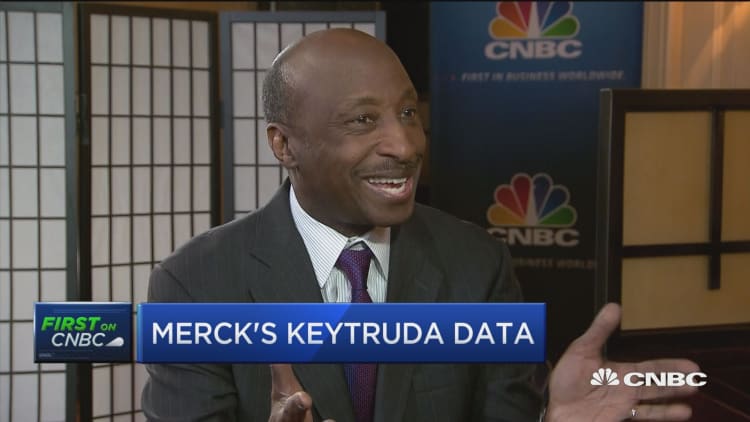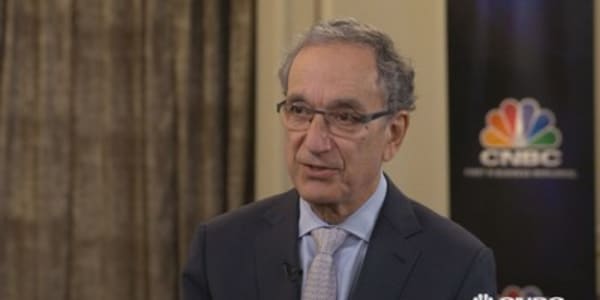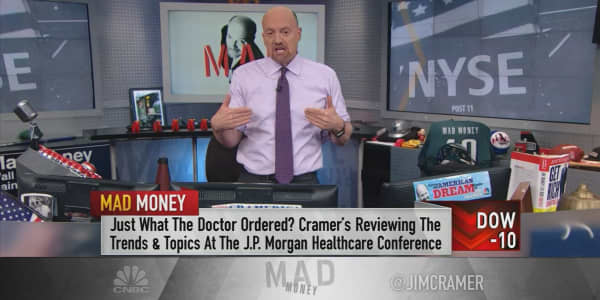
The CEO of drug giant Merck said Monday that not enough of the rebates being negotiated for medications are being passed on to consumers.
"Rebates being paid by pharmaceutical companies, it's about a third of what branded [drug] companies actually have as a list price," Merck's chief Ken Frazier told CNBC at the J.P. Morgan Healthcare Conference.
"A third of that goes into the distribution system through insurance companies, PBMs [pharmacy benefit managers] and others through rebates," Frazier said.
"I think what's really broken, if you want to call it that, [is] that those rebates are not passed on to consumers," Frazier said, echoing a line that a number of drugmakers have been making.
"We think what we really have to do is get some of those rebates, which are the product of intense negotiations with the supply chain, on to the people who need it at the pharmacy counter."
Pharmacy benefit managers, which oversee drug insurance plans for customers, have pushed back against the idea that they are primarily to blame for rising prices, as opposed to the makers of the medications themselves.
Frazier's comments on rebates came as he was asked about the possibility of mega-online vendor Amazon entering the drug-delivery business.
"If that's a more efficient way of getting drugs to patients, we would be in favor of it," Frazier said.
Drugmakers such as Merck have faced criticism in recent years for raising prices of their products. President Donald Trump, in particular, has on occasion blasted drug companies for their prices.
Frazier resigned last summer from Trump's manufacturing council in protest of the president's equivocal response to the racist-fueled violence during demonstrations in Charlottesville, Virginia, last summer.
Trump quickly lashed out at Frazier, accusing Merck of having "ripoff" prices.
On Monday, Frazier was asked by CNBC if he was surprised or insulted by the president's comments.
"I can't say I was surprised," Frazier answered. "I made my statement; the president made his statement in response."
Frazier said Merck continues to work with the administration and Congress and credited Trump for being "focused on American business, competitiveness, jobs."
Asked why prices for Merck's medications have to be raised every year, Frazier defended the practice by saying the price hikes are "modest, so to speak, in the low- to mid-single digits."
"What we've tried to do is ... make sure we have the right balance between the kind of return we need on investment in order to continue to invest in research and make sure drugs are still affordable," Frazier said.
He said he expected there to be continued attention this year on the issue of rising drug prices, both by the Trump administration and by Congress.
"The good news, from everything I sense, [is that] people want to do that in a way that's actually consistent with supporting innovation," Frazier said.
He also said that to address the issue of rising drug costs, he opposed "price controls and things of that nature, which have been discredited and discarded in the past."
"I think anything that supports a market-based approach to that is a good approach," said Frazier, specifically citing a push by Dr. Scott Gottlieb, the head of the Food and Drug Administration, to speed up the approval process for generic drugs.
Frazier said the recent tax bill passed by Congress and signed by Trump "will allow us to compete on an even basis with our ... competitors."
He said he does not expect the effects of the bill to change how Merck allocates its capital.
"We're going to continue to spend money on the science as we've always done, and we're going to build plants where we have an opportunity to do that, and we're going to hire people [as] our business expands," he said.
Even before the tax bill, Frazier said, "We had enough power in our balance sheet and enough financial flexibility in terms of our ability to access capital so that we could do the kinds of deals that Merck wants to do."





